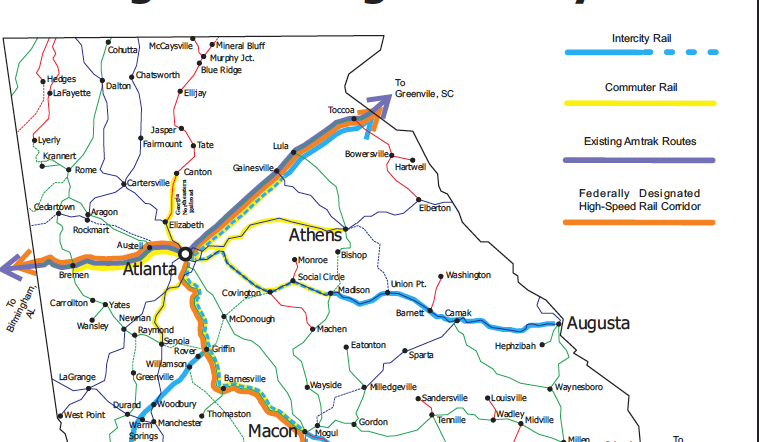Now, while heavy rail is better (for dense city areas), it's also much much more expensive, and I am generally quite supportive of light rail, and I am generally supportive even of modern streetcars.
However, even though I really, really hate to say anything to undermine A.J. Robinson and Central Atlanta Progress, I have to oppose the Atlanta streetcar.
This is not to say I am against adding passenger rail capacity that runs in the streets in denser areas of Atlanta. I differ with AJC's in-house 30-something right-winger Kyle Wingfield on that.
However, Mr. Wingfield made some good points, and unlike far too many right-wingers, spends probably more of his column bashing wasteful highway spending (on the other hand, Wingfield is terribly handicapped by his position against actual planning instead of letting developers run hog-wild with no regard for anything else like this country has for the last 60 years; he fails to realize that laying transit to encourage smart development is a good thing, and should visit Washington, DC and I'm told, Portland, if he doesn't believe me).
Tourists would be the biggest beneficiaries of the streetcar, which would run from the aquarium, alongside Centennial Olympic Park, through Fairlie-Poplar, and finally down Auburn Avenue to historic sites from the civil rights era.
Nothing against tourists, but Atlanta’s biggest congestion headaches come from commuting, not tourism, and generally are on highways, not downtown surface streets.
And never mind that MARTA already runs a subway line that comes within a couple of blocks of most of the major destinations, is canceling a little-used bus route that’s very similar to the proposed streetcar’s path, and discontinued a previous tourist trolley in the same area due to poor ridership.
The broader plan also calls for a trolley line along Peachtree Street, north to Brookhaven and south toward Fort McPherson. It’s central to an attempt to create Atlanta’s version of the Champs-Élysées in Paris or Michigan Avenue in Chicago.
Actually, MARTA runs BOTH of its lines (well, technically there are four lines, but they split only at the ends, with the east-west line only having one green-line only station) in the area around the initial proposal for the streetcar.
Typical tourists would not use it either, as typical tourists will be willing to walk a mere 2-3 miles over the course of a day or two of seeing a city. Only fat/lazy/old and wheelchairless tourists would use it (this is why they canceled the non-rail tourist trolley, I assume).
Moreover, I cannot really see commuters using it. Businesses in downtown are basically all already close enough to MARTA that people are not going to waste time waiting for a streetcar because they can walk from the MARTA station and get there more quickly. Or rather, any businesses that are not close enough are also not close enough to be much shorter walking distances from the streetcar that would be necessary for people to transfer rather than just walking.
Of course, the really ugly thing about Downtown (and Midtown) as, for some reason, Mr. Robinson seems to miss is the unholy percentage of both of them devoted to parking lots.
I filled in all (or almost all; I may have missed a few so it may be worse) of the parking lots in downtown (north of I-20, west of I-75/I-85, east of the major rail line (leaving out the area between it and Northside, and south of Ivan Allen). Look (the embedding has so many lots it won't even show) here; it's absolutely unbelievable.
Note if I'd included the full downtown, with borders of I-20 on south, Piedmont on the east, Northside on the West, and North Avenue on the North, it would be just as bad, but Google Maps can't draw that many vector shapes.
Anyway, it's really really wasteful to have to have so much parking in the middle of town, where as many offices should ideally be located to minimize aggregate commutes while affording freedom of places to live.
That being said, the smartest thing to do to expand rail transit would be to browbeat/coerce (I can think of all sorts of unorthodox ways to do so) Gwinnett and Cobb into joining MARTA, and extending the Green Line north through rail corridors through Knight Park to Underwood Hills, then west across the Chattahoochee, following the rail corridor north through Vinings to Cumberland Mall, Symrna and then ending in downtown Marietta or cutting from there to the Interstate and heading to Kennesaw State.
Additionally, extending the Gold Line along the Buford Highway rail corridor northeast from Doraville through to Norcross and Duluth.
Too bad it wasn't done already. Atlanta has been majorly losing ground on mobility.



